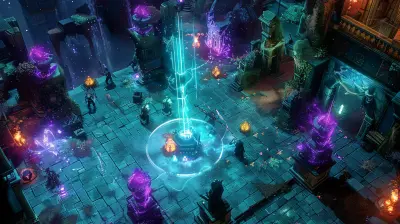How Time Management Games Can Help Improve Your Focus
4 September 2025
Let’s be real — staying focused these days feels like trying to juggle flaming swords while riding a unicycle. Between social media pings, endless to-do lists, and the occasional (okay, frequent) urge to binge-watch something, keeping your attention locked in one place is hard. But what if I told you that playing games — yes, actual games — could be the secret weapon to sharpening your focus and managing your time like a boss?
Sounds too good to be true? Stick around. We’re diving deep into how time management games can help improve your focus, and why you might want to replace your next doom scroll with a few rounds of strategic gameplay.
What Are Time Management Games Anyway?
Before we hit the gas, let’s get on the same page.Time management games are a subgenre of strategy games where players have to complete tasks within tight deadlines, juggle limited resources, and make quick decisions under pressure. Think classic titles like Diner Dash, Overcooked, Two Point Hospital, or Cook, Serve, Delicious!
These games aren’t just about clicking fast — they’re about thinking smart, staying organized, and adapting on the fly. In fact, they're sneakily training your brain to get better at real-life stuff — like focusing, prioritizing, and not melting down when things get hectic.
Why Focus Is So Hard These Days
Let’s face it — our attention spans have taken a serious hit. Blame it on the dopamine loops from social media, constant notifications, or simply the fast-paced nature of modern life. We're multitasking more than ever, but getting less done.It’s like trying to write an essay while a marching band plays in your living room.
Here’s the thing: focus is a skill. Just like any other skill, it can be trained, worked on, and improved. And guess what? Time management games can be one clever — and fun — way to do just that.
The Psychology Behind Time Management Games and Focus
So how do time management games actually work their magic?Let’s dig into the psychology a bit.
1. They Train You to Prioritize Under Pressure
In most time management games, you’re given multiple tasks at once. Maybe a virtual customer is waiting on their food, another needs a seat, and the kitchen’s on fire (okay, hopefully not literally). You’ve got seconds to sort it all out.Your brain learns to:
- Assess priorities quickly
- Decide what needs your attention right now
- Let go of perfect and focus on done
Over time, this starts to mirror real life. Instead of getting overwhelmed with your own endless tasks, you start to zoom in on what matters first. That’s focus, baby.
2. Reinforcement Loops Keep You Hooked (In a Good Way)
Games are genius when it comes to feedback. You do something right — BAM! You get points, stars, in-game cash. These instant “rewards” keep you engaged and reinforce good behaviors.That means every time you focus well and make the right decision, your brain gets a little dopamine hit. It’s like giving your mind a treat for staying on track.
3. They’re Challenging (But Just Enough)
One reason time management games are so addictive? They operate in what’s called the flow zone.You’re not bored, but you're not overwhelmed either. The challenge feels just right. This state of flow is where focus thrives — your brain is fully engaged, time flies, and you’re laser-locked into the moment.
Want to improve focus? Chase that “flow” experience. These games are full of it.
Real-Life Skills You’ll Start Picking Up
If you think those late-night gaming sessions are just digital fluff, think again. The habits you build while playing time management games don’t stay on the screen.Let’s break down some of the practical focus-boosting skills you accidentally develop while playing:
➤ Quick Decision Making
You can’t sit and ponder too long when timers are ticking. Over time, you train yourself to make faster, smarter decisions — a super useful focus skill for real life.➤ Multitasking Without Losing Your Mind
Juggling different objectives at once without dropping the ball? That’s the bread and butter of these games. You’ll find yourself better able to handle multiple real-world tasks without the usual brain fog.➤ Improved Memory Recall
Many time management games require you to remember orders, tasks, or processes and execute them in order. This builds up your working memory, which is directly tied to better focus and information retention.➤ Stress Management
Yes, chaos is part of the game — but learning to keep your cool under pressure carries over. You get better at not letting stress break your concentration.Who Can Benefit from Time Management Games?
Short answer? Pretty much anyone. But let’s take a closer look.🧠 Students
Got a paper due and a hundred other things on your brain? These games can help you learn to manage your workload and focus on what needs to get done first.💼 Professionals
If you're always switching between tasks, dealing with tight deadlines, and trying to stay productive, time management games can help you build better decision-making patterns and focus discipline.🧩 People with ADHD
While everyone is different, many people with ADHD find time management games helpful for practicing focus in a low-pressure environment. The built-in rewards and structure provide feedback loops that support attention regulation.👨👩👧 Parents and Kids
Believe it or not, playing time management games with your kids can help both of you develop patience, scheduling skills, and focus — and hey, it’s quality bonding time too.Top Time Management Games That Train Your Focus
Looking to get started? Here’s a handy list of some fan-favorite titles that are both fun and brain-boosting.🎮 Diner Dash
The OG of time management games. You’ll manage tables, fulfill orders, and try to keep everyone happy without losing your mind.🎮 Overcooked (1 & 2)
This hilarious (and often chaotic) multiplayer cooking game forces you to communicate, coordinate, and make lightning-quick decisions.🎮 Two Point Hospital
If you’ve ever dreamed of running your own hospital, this is it — treat patients, upgrade tech, and keep everything running smoothly.🎮 Time Management Simulator
A more grounded option that simulates actual life responsibilities like job tasks, time blocking, and goal setting.🎮 Cook, Serve, Delicious!
It’s all about speed, accuracy, and satisfying customers with the perfect plate. Pure adrenaline for your brain cells.A Word of Caution: Don’t Overdo It
Okay, okay — yes, we just hyped up gaming like it’s a miracle cure for distraction. But moderation is key.Spending too much time gaming can have the opposite effect and start stealing focus instead of building it. Think balance: 30 minutes of a time management game as a “brain workout” is awesome. Five hours every day? Maybe not helping your productivity.
Treat these games like mental training sessions — when used mindfully, they’re a powerful tool for sharpening your attention and mastering your time.
Tips to Maximize the Focus Benefits of These Games
Want to level up your brain while you play? Try these tips:- ✅ Set a time limit: Use a timer to keep your sessions short and focused.
- ✅ Reflect after playing: What strategies helped you succeed? What could you do differently?
- ✅ Avoid multi-window distractions: Don’t play with 10 tabs open — give the game your full attention.
- ✅ Use games during breaks: A quick round can energize your brain for the next big task.
- ✅ Switch up the challenge: Once a game gets too easy, find a new one that pushes your limits.
Final Thoughts: Small Game, Big Gains
Here’s the wild thing — that fast-paced kitchen chaos in a video game? It's secretly turning you into a more focused, efficient, and adaptable human being.Time management games are more than just stress-relievers or entertainment. They’re training simulators for modern life. In a world where attention is constantly under attack, these fun little challenges can help you reclaim your focus and take control of your time — one level at a time.
So go ahead. Play the game. Boost your brain. And start managing your focus like the hero you are.
all images in this post were generated using AI tools
Category:
Time Management GamesAuthor:

Jack McKinstry
Discussion
rate this article
1 comments
Olive Potter
Great insights! I'm curious how these games could boost productivity in real-life scenarios.
September 14, 2025 at 3:46 AM

Jack McKinstry
Thank you! Time management games enhance focus by encouraging strategic thinking, prioritization, and quick decision-making, skills that translate effectively to real-life productivity.


